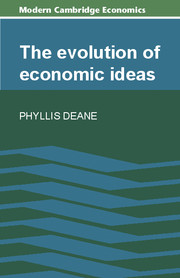Book contents
- Frontmatter
- Series preface
- Contents
- Introduction
- 1 Origins of modern economics
- 2 Adam Smith's theory of value
- 3 Origins of modern growth theory
- 4 Classical monetary theory
- 5 Ricardo on value, distribution and growth
- 6 Scope and methodology of classical political economy
- 7 The marginal revolution and the neo-classical triumph
- 8 The neo-classical theory of value
- 9 The Marxian alternative
- 10 Neo-classical orthodoxy in the inter-war period
- 11 Monetary theory in the neo-classical era
- 12 The Keynesian revolution
- 13 Twentieth-century growth theory
- 14 Methodological divisions in economics since Keynes
- Index of names
- Subject index
2 - Adam Smith's theory of value
Published online by Cambridge University Press: 05 June 2012
- Frontmatter
- Series preface
- Contents
- Introduction
- 1 Origins of modern economics
- 2 Adam Smith's theory of value
- 3 Origins of modern growth theory
- 4 Classical monetary theory
- 5 Ricardo on value, distribution and growth
- 6 Scope and methodology of classical political economy
- 7 The marginal revolution and the neo-classical triumph
- 8 The neo-classical theory of value
- 9 The Marxian alternative
- 10 Neo-classical orthodoxy in the inter-war period
- 11 Monetary theory in the neo-classical era
- 12 The Keynesian revolution
- 13 Twentieth-century growth theory
- 14 Methodological divisions in economics since Keynes
- Index of names
- Subject index
Summary
Whatever the philosophical or methodological approach economists have taken to their discipline, whatever view they have taken of its scope, objectives and analytical techniques, the theory of value – with its associated theory of distribution – has been a key feature of the disciplinary matrix or paradigm to which they have chosen to conform. The prevailing concept of value and the use made of it has altered, chameleon-fashion, to match the currently accepted economic doctrines. In pre-mercantilist periods, when it would be an exaggeration to say that there was an explicit theory of value, the concept of value reflected current attitudes to economic questions. For example, in medieval scholastic doctrine the value of the commodity tended to be identified with the morally right price. In a static, parochialised economic and social order the just price would equal the customary price, reflecting a socially accepted scale of values, and the whole community would know what the fair price ought to be. However when the market became more dominant in economic life, there was an increasing tendency for the concept of the just price to coincide with the normal (competitive) market price, including an element of normal profit. For this too became a customary price which could be justified as being the proper one. Realists such as Thomas Aquinas did not hesitate to identify the actual market price, even when inflated by temporary scarcity, with the just price.
- Type
- Chapter
- Information
- The Evolution of Economic Ideas , pp. 19 - 28Publisher: Cambridge University PressPrint publication year: 1978

